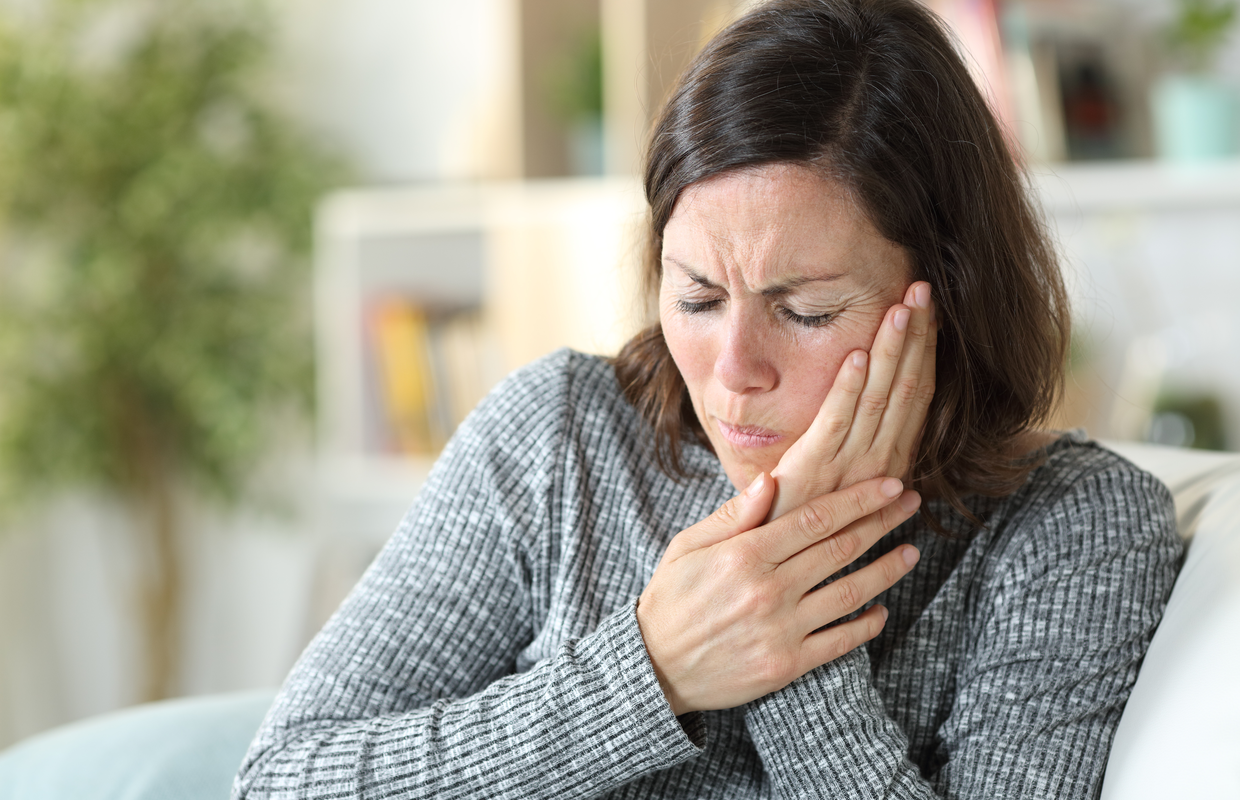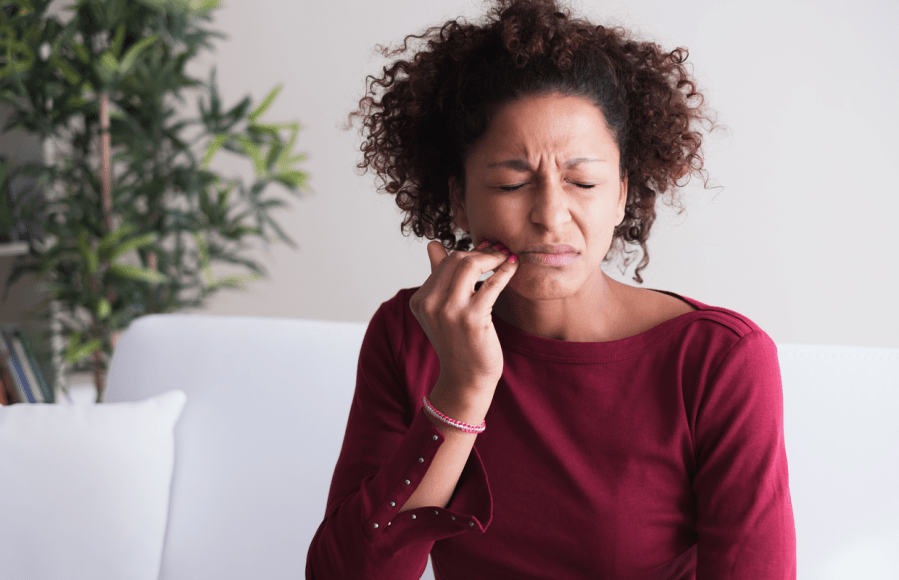During menopause, many women struggle with a whole host of different mouth problems. From dry mouth and sensitive gums to stress-related grinding and gum disease, we take a closer look at why these problems might arise and how to keep your mouth healthy throughout the menopause and beyond…
If there was ever a time in your life to indulge in self-care, it’s during peri-menopause. A little love goes a long way, and while you may be on top of things with a luxurious skincare routine or regular mindful practice, there is one particular aspect of your health and beauty routine that’s easy to brush over, and that’s oral hygiene.
Holistic biological dentist Dr Zac Cox BDS believes taking care of your teeth is about more than just flossing. Many factors come into play, including nutrition, stress, diet and even exercise. ‘As women reach menopause, hormonal changes make them more prone to oral problems,’ he says. As with elsewhere in your body, big changes are occurring in your mouth but by upgrading your dental hygiene routine you’ll keep on smiling.
Common mouth problems during menopause

Dry mouth during menopause
Why it occurs:
Oestrogen plays an important role in creating saliva, so when this hormone is reduced during the menopause, your mouth can get dry. At its worst, dry mouth can trigger a burning or itching sensation, numbness or a metallic taste, as well as a stickiness that can make it hard to swallow or speak.
It can also effect your teeth. ‘Saliva rinses cavity-causing bacteria off your teeth throughout the day, neutralises acids and brings in minerals to help rebuild tooth enamel. When your mouth is very dry for extended periods of time, you’re at higher risk for cavities,’ says Dr Cox.
What to do:
What you eat can make a big difference. Overly salty, spicy and sugary foods as well as tobacco and caffeine exacerbate symptoms of dry mouth and deplete oestrogen further. So, cutting these out is a good first step. At night, sleeping with a humidifier in your room can help.
Sensitive gums during menopause
Why it occurs:
Fluctuating hormones and blood flow to the mouth during menopause can cause gums to become inflamed, or just more sensitive than usual. On its own, this is uncomfortable but not hugely problematic.
However, the result is often that proper brushing and flossing that is so important at this time becomes, quite literally, a pain. Being unable to care for your teeth and gums can then lead to more severe issues such as infections of the structures around the teeth.
What to do:
Curcumin, found in turmeric, is a wonderful anti-inflammatory. Make a paste with a ¼tsp of turmeric powder and a little water, then apply directly to the gums for five minutes before rinsing – this can really help to reduce inflammation.
If sensitive gums are an issue, it’s well worth upgrading your tooth care kit to something gentle but effective, to avoid further complications. The ION-Sei Electric Toothbrush (£129.99) uses a patented ionic technology, rather than vigorous scrubbing, to clean your teeth. Negative ions are created by the interaction of UV LED light and the integrated titanium dioxide bar in the brush, which generates ideal conditions for supressing plaque and cavity-causing bacteria.
Research conducted by the Japan Food Research Laboratories in 2018 showed this technology is better than manual brushing alone. Better yet, the study also found that consistent brushing with this tool reverses the charge found on the surface of teeth, meaning your teeth actually repel plaque making it less likely to stick.
Flossing can also be painful, so you may want to invest in a water flosser, such as the ones by Water Pik (from £44.99). These are just as, if not more, effective at removing plaque but are far gentler.

Stress-related teeth grinding during menopause
Why it occurs:
Chronic stress and irritability are a well-known side effects of menopause. A paper published by the Journal of Psychiatric Neuroscience reported that up to 70 per cent of women experience hormonal emotional imbalance.
Such upset can come about as a result of struggling with other menopause symptoms, but it can also occur as a stand- alone issue. This can trigger stress-related tooth grinding, which often results in facial pain, headaches and worn-down teeth.
What to do:
‘Emotionally, I like to support my patients with homeopathy and flower remedies, such as Bach Holly (£7.35) for anger and irritation, or Bach Agrimony (£5.43, amazon.co.uk) for those who feel mentally tortured but hide this behind a cheery face – the “I’m fine” types,’ says Dr Cox.
‘Homeopathically I often prescribe Aconite for nervousness, fear and tension or Lachesis for depression, palpitations and flushes. I also like to ensure my patients’ immune systems are supported with medicinal mushrooms, noni (a traditional Tahitian medicinal fruit), ambrotose (a plant-based, glyconutrient supplement) and sea green supplements such as Ishga Organic Seaweed Capsules, (£24.95). This general health boost can help reduce other symptoms and stress.’
Gum disease in menopause
Why it occurs:
‘Gum disease is the primary concern when it comes to menopause, although the exact reason why this happens isnot fully known,’ explains Dr Cox. ‘My suspicions are that the change in hormones may induce a state of irritability, which most likely affects liver function and, in turn, may impair the vitamin D3 levels leading to lowered immunity, giving rise to breakdown of the gums.’
Gum disease is also thought to be linked to the onset of osteoporosis, mainly caused by the softening of the jawbone, which can occur due to lower oestrogen levels. This was supported by a study by The North American Menopause Society in 2017, in which 492 postmenopausal women were treated with oestrogen to see whether there was any effect on their oral health. Treated women had a 44 per cent lower occurrence of gum disease than those untreated.
What to do:
HRT is not for everyone, but there are many natural ways to give your oestrogen levels a boost if you’re struggling with mouth problems, like gum disease, during menopause. A diet rich in phytoestrogens (soybeans, flaxseeds, broccoli, healthy fats and wholegrains) and low in inflammatory foods (sugar, processed carbs, dairy and fatty meats) can work wonders.
Staying hydrated is also essential not only for hormone regulation but for gum health. Dr Cox also recommends vitamin D3 supplementation. ‘D3 is vital for calcium absorption from the gut. Reduced levels affect mineral metabolism and bone growth. This leads to osteoporosis, which is associated with gum disease. I usually put my patients on a Liposomal vitamin D3/K2 supplement to safely boost D3 levels.’
Related: Menopausal hay fever: how menopause affects allergies
Words: Ruby Deevoy | Images: Shutterstock








